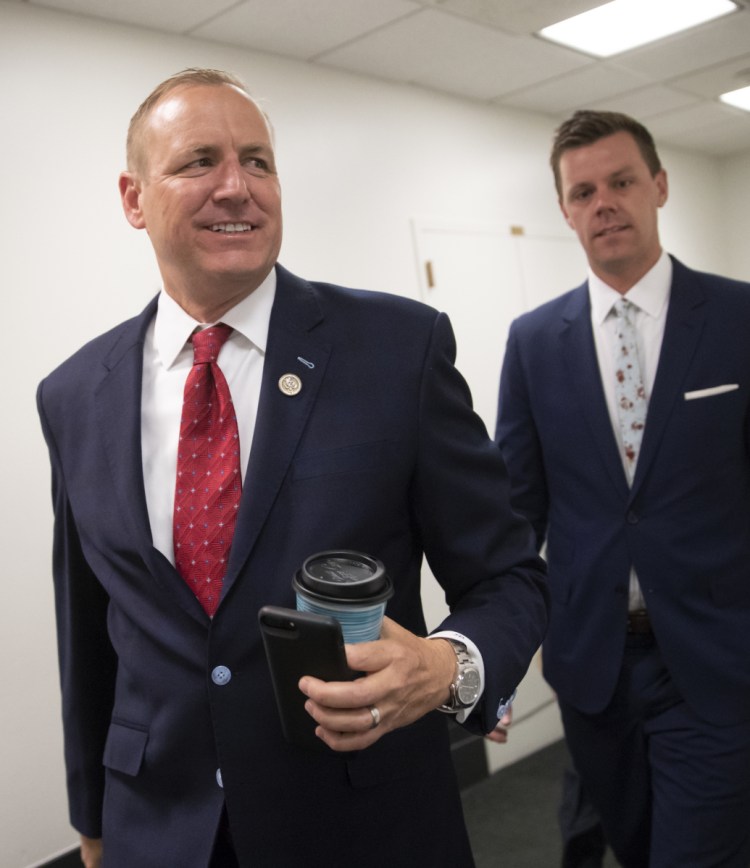WASHINGTON — House Republicans failed to produce an immigration compromise last week as the standoff between opposing conservative and moderate factions heads toward a showdown over an issue that has long divided the party.
House Majority Leader Kevin McCarthy convened a closed-door meeting as party leadership faces mounting pressure to produce an immigration bill by a Tuesday deadline.
But lawmakers emerged without a deal. With Speaker Paul Ryan away at a fundraiser, the negotiations are seen as a test for McCarthy, a potential speaker-in-waiting, to pull together the often unruly Republican majority and prevent a showdown. Talks are expected to continue.
“There’s no agreement right now,” said Rep. Steve Scalise, R-La., the Republican Whip, another vying to move-up the leadership ladder.
It was the second time last week leaders drew the Republican factions together to huddle privately and wade through the complexity of the immigration issue. Lawmakers were upbeat at the prospect of being presented with an outline after days of talks.
But without resolution, the centrists warn they will have enough petition signatures by Tuesday to force House votes later this month, including on their preferred bill which provides young “Dreamer” immigrants protection from deportation and a chance to apply for citizenship.
Rep. Jeff Denham, R-Calif., a leader of the moderates, exiting the meeting saying he was “disappointed” that new demands were being made. Moderates believe they have compromised a lot.
“We’re trying to close items out, not add new ones,” he said. He vowed that by Tuesday it was “extremely likely” they would have the signatures needed to push the roll calls.
The groups said they made progress toward a resolution for the young immigrants who have been living in the U.S. illegally since childhood, with a plan to protect them from deportation and provide them a bridge to legal status and eventual citizenship. But new questions emerged over how far the package should go to clamp down on immigration enforcement in the U.S., beyond the $25 billion both sides have largely agreed to for President Trump’s border wall with Mexico.
Many conservatives have opposed a pathway to citizenship for the young immigrants and want more enforcement of illegal immigration, including an end to so-called sanctuary cities.
“If there’s going to be concessions made on one side, you have to get everything that you need on the security side,” said Rep. Scott Perry, R-Pa.
The flurry underscored the escalating pressure Republicans face to address immigration, an issue pitting centrists representing Hispanic and moderate voters against conservatives with deep-red constituents sympathetic to Trump’s anti-immigrant outbursts.
Painfully aware of those divisions, leaders had seemed happy to sidestep the issue as they head into campaign season for the fall midterm elections until the moderates’ rebellion forced their hand. If enough signatures are collected Tuesday, the House would be on track to have roll call votes on various proposals on June 25.
Ryan and Republican leaders are trying desperately to stop the moderates’ preferred bill from coming to the floor. It would draw widespread Democratic support and leaders say passage would damage the party’s electoral prospects by souring Republican voters.
McCarthy has taken a leading role in forging a compromise in what in many ways is an audition in his campaign to become speaker once Ryan retires, if Republicans keep majority control in the fall midterm election.
“There’s a whole lot more that we agree on than we disagree on,” said Rep. Mark Meadows, R-N.C., a leader of the conservative House Freedom Caucus, “and yet there’s still not a deal.”
Lawmakers said they were focusing on one of two options outlined for the young immigrants.
It would create a new visa category that combines permits for the “Dreamer” immigrants with those for immigrants who now use other programs, including the diversity lottery and family visas. There would be a new merit system to assess some of the new immigrants.
Details on the new visa system remain unclear, and lawmakers declined to disclose more as negotiations continued.
There’s uncertainty over what would happen after the end of the eight-year visa program, but Denham said participants have characterized the proposal as a bridge to the legal immigration system – which suggests a pathway to remaining in the U.S. permanently.
Rep. Carlos Curbelo, R-Fla., another leader of the moderates, said the young immigrants would have immediate protection, “meaning you never again have to worry about deportation as long as you follow this country’s laws.”
Lawmakers are rushing to fix the situation for the young immigrants after Trump ended the Obama-era Deferred Action for Childhood Arrivals program, called DACA, though it largely continues running pending a legal challenge. It gave nearly 700,000 of the young immigrants temporary permission to live and work in the U.S. The affected population of young immigrants is much larger.
Conservatives have been adamant about not providing a “special” process carving out a unique way for those young immigrants to gain legal status.
Trump has said that in exchange for providing possible citizenship for them, he wants full financing for his wall with Mexico. He’s also wanted to end a lottery that distributes about 50,000 visas annually to countries with few U.S. immigrants and to limit the relatives legal immigrants can bring to this country.
Send questions/comments to the editors.


